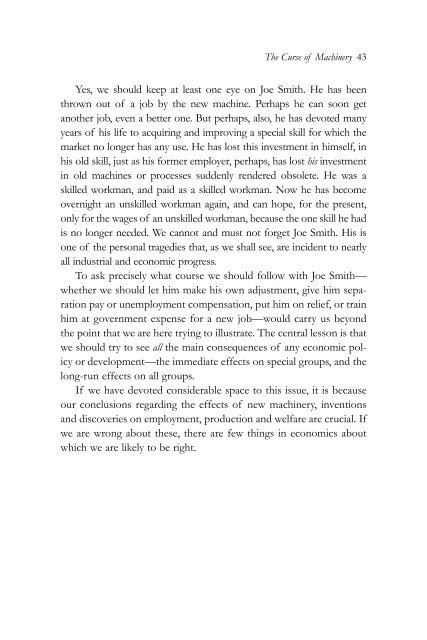- Page 2:
Economics in One Lesson
- Page 9 and 10: viii Economics in One Lessonsubject
- Page 11 and 12: x Economics in One LessonWhen it ca
- Page 13 and 14: xii Economics in One Lessonnow pass
- Page 15 and 16: xiv Economics in One Lessonbe fully
- Page 18 and 19: CHAPTER 1The Lesson1Economics is ha
- Page 20 and 21: The Lesson 5policies may become evi
- Page 22: The Lesson 7are illustrated by exam
- Page 26 and 27: CHAPTER 2The Broken WindowLet us be
- Page 28 and 29: CHAPTER 3The Blessings of Destructi
- Page 30 and 31: The Blessings of Destruction 15beca
- Page 32 and 33: CHAPTER 4Public Works Mean Taxes1Th
- Page 34 and 35: Public Works Mean Taxes 19absolutel
- Page 36 and 37: Public Works Mean Taxes 21a lump su
- Page 38 and 39: CHAPTER 5Taxes Discourage Productio
- Page 40 and 41: CHAPTER 6Credit Diverts Production1
- Page 42 and 43: Credit Diverts Production 27whole c
- Page 44 and 45: Credit Diverts Production 29a chari
- Page 46 and 47: Credit Diverts Production 31The pri
- Page 48 and 49: CHAPTER 7The Curse of Machinery1Amo
- Page 50 and 51: The Curse of Machinery 35If the rea
- Page 52 and 53: The Curse of Machinery 37Mr. Edward
- Page 54 and 55: The Curse of Machinery 39long run t
- Page 56 and 57: The Curse of Machinery 41argued, fo
- Page 60 and 61: CHAPTER 8Spread-the-Work SchemesIha
- Page 62 and 63: Spread-the-Work Schemes 47these is
- Page 64 and 65: Spread-the-Work Schemes 49words, ha
- Page 66 and 67: CHAPTER 9Disbanding Troops and Bure
- Page 68 and 69: Disbanding Troops and Bureaucrats 5
- Page 70 and 71: CHAPTER 10The Fetish of Full Employ
- Page 72: The Fetish of Full Employment 57Chi
- Page 75 and 76: 60 Economics in One Lessonsophistry
- Page 77 and 78: 62 Economics in One Lessonthat they
- Page 79 and 80: 64 Economics in One Lesson4It is im
- Page 81 and 82: 66 Economics in One Lessonconflict
- Page 83 and 84: 68 Economics in One Lessonshould no
- Page 85 and 86: 70 Economics in One Lessonuntil the
- Page 87 and 88: 72 Economics in One Lessontraced me
- Page 90 and 91: 1CHAPTER 13“Parity” PricesSpeci
- Page 92 and 93: “Parity” Prices 77improved six-
- Page 94 and 95: “Parity” Prices 79balance indus
- Page 96: “Parity” Prices 81We could solv
- Page 99 and 100: 84 Economics in One Lessonwas compe
- Page 101 and 102: 86 Economics in One Lessonefficient
- Page 104 and 105: CHAPTER 15How the Price System Work
- Page 106 and 107: How the Price System Works 91to wor
- Page 108 and 109:
How the Price System Works 93fly aw
- Page 110:
How the Price System Works 95trying
- Page 113 and 114:
98 Economics in One LessonThere are
- Page 115 and 116:
100 Economics in One LessonExcessiv
- Page 117 and 118:
102 Economics in One Lessonnothing
- Page 120 and 121:
CHAPTER 17Government Price-Fixing1W
- Page 122 and 123:
Government Price-Fixing 107increase
- Page 124 and 125:
Government Price-Fixing 109Passing
- Page 126 and 127:
Government Price-Fixing 111effect,
- Page 128:
Government Price-Fixing 113producti
- Page 131 and 132:
116 Economics in One Lessonlarger t
- Page 133 and 134:
118 Economics in One Lessonexample,
- Page 136 and 137:
CHAPTER 19Do Unions Really Raise Wa
- Page 138 and 139:
Do Unions Really Raise Wages? 123On
- Page 140 and 141:
Do Unions Really Raise Wages? 125pr
- Page 142 and 143:
Do Unions Really Raise Wages? 127ca
- Page 144 and 145:
Do Unions Really Raise Wages? 129no
- Page 146:
Do Unions Really Raise Wages? 131Th
- Page 149 and 150:
134 Economics in One LessonThe doct
- Page 151 and 152:
136 Economics in One Lessonif monet
- Page 153 and 154:
138 Economics in One Lessonotherwis
- Page 156 and 157:
CHAPTER 21The Function of ProfitsTh
- Page 158 and 159:
The Function of Profits 143make it,
- Page 160 and 161:
CHAPTER 22The Mirage of Inflation1I
- Page 162 and 163:
The Mirage of Inflation 147once; on
- Page 164 and 165:
The Mirage of Inflation 149lead mer
- Page 166 and 167:
The Mirage of Inflation 151the over
- Page 168 and 169:
The Mirage of Inflation 153sophisti
- Page 170 and 171:
The Mirage of Inflation 1556And thi
- Page 172:
The Mirage of Inflation 157will be
- Page 175 and 176:
160 Economics in One Lessonand the
- Page 177 and 178:
162 Economics in One Lesson“Savin
- Page 179 and 180:
164 Economics in One Lessonon the e
- Page 181 and 182:
166 Economics in One Lessoneach yea
- Page 183 and 184:
168 Economics in One Lessoneach oth
- Page 185 and 186:
170 Economics in One Lessonof capit
- Page 188:
Part Three: The Lesson Restated
- Page 191 and 192:
176 Economics in One Lessonanswer a
- Page 193 and 194:
178 Economics in One Lessonto creat
- Page 195 and 196:
180 Economics in One LessonThis doe
- Page 197 and 198:
182 Economics in One Lessontemporar
- Page 200 and 201:
IndexAmerican AAA plan, 79American
- Page 202 and 203:
Index 187interest rates and savings
- Page 204:
Index 189wage laws, viii-ix, 115-19


